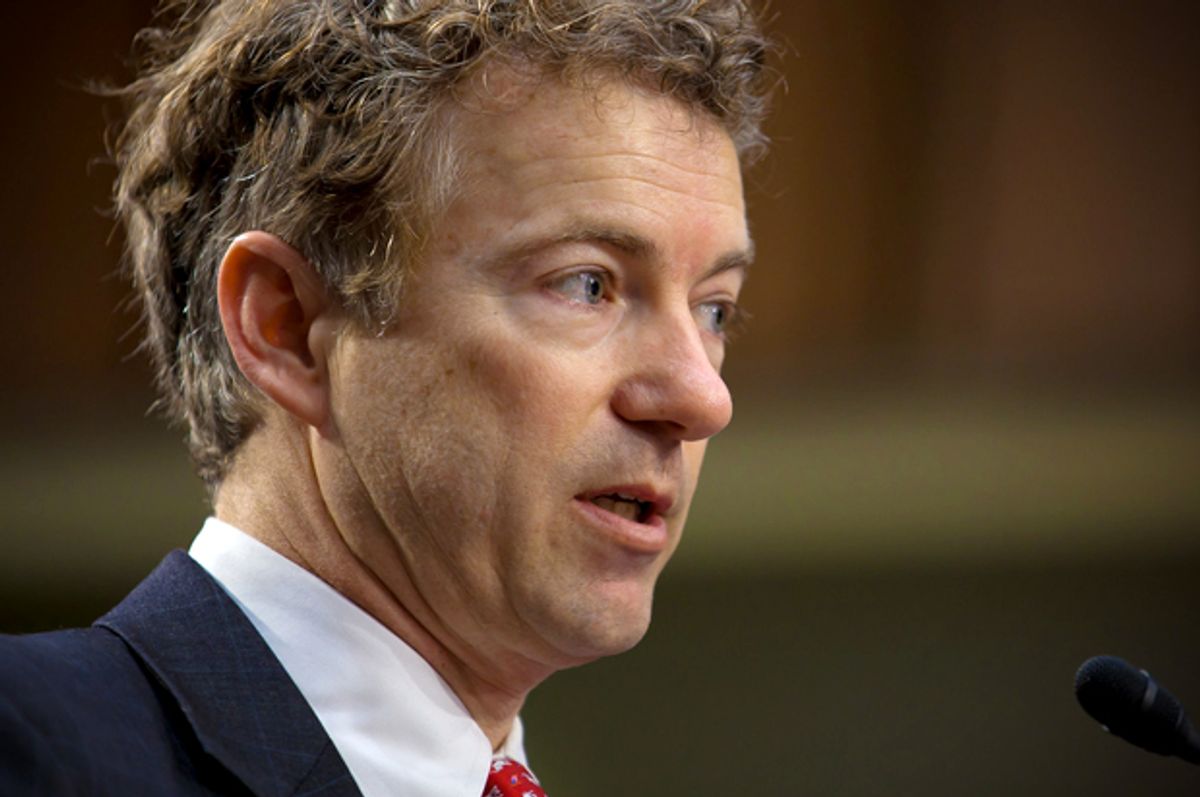The extent of modern GOP presidential candidates' outreach to black voters is... narrow. As in, there's one event, total. The GOP presidential candidate will give a bland address to the NAACP convention, and that's it. His advisors tell him that he's made the perfunctory appearance, checked the box, and there's no more point to contesting for votes. Reporters will occasionally ask the GOP presidential candidate why they deserve black voters' support, and the response is typically something about how Abraham Lincoln was a Republican and it was the Democrats who held back civil rights. As though the last fifty years of American politics have been an act of mass hypnotism and not the product of events.
So at first, it comes off as a bit laughable that Sen. Rand Paul would argue that "fully a third of the African-American vote" will be open to the Republican message in 2016, as opposed to the typical ~10 percent. A quick survey of most of the preliminary Republican field indicates that yes, this is laughably lofty and unlikely to transpire. But there is one presumptive candidate out there who has the beginnings, at least, of a plausible Republican platform to pitch to black voters, and that's Rand Paul. And it would be a positive thing for the development Republican party, for African Americans, and for the country in general if Rand Paul continues to pursue this sort of outreach.
Paul's first widely publicized attempt to appeal to African Americans, in a speech at Howard University, went poorly and earned him much mockery. It was all deserved. He said the specific things that merit mockery. He made the lazy appeal to Abraham Lincoln and the condescending "a-ha!" lecture about how Democratic politicians were behind Jim Crow laws. Politicians will not ingratiate themselves with ignored communities by engaging in this sort of politics-as-pub-trivia in a cheap attempt to skate past generations of very obvious political shifts -- like how all Democratic segregationists became Republicans when the Democratic party forcefully pursued a civil rights agenda. You know, that whole thing.
Since then, though, Paul has taken things more seriously, and to a certain extent put himself on the line within his party. He's pushed for a serious package of criminal justice reforms to eradicate over-the-top policies that target communities of color. He wants to do away with mandatory minimum sentencing guidelines for non-violent offenders. He wants to fully eliminate the disparities for crack and powder cocaine possession sentences. He wants to make it easier for non-violent juvenile offenders' criminal records to be expunged. And more. He's called out police militarization and law enforcement's targeting of black communities. He visited Ferguson. He's also been one of the very, very few high-profile figures in his party to call out voter ID laws -- until he walked back those comments, as soon as conservative editorialists gave him grief over it. He should consider... what's the word? Un-walking-back them, or whatever. (He should say that voter ID laws are a problem.)
It's not that he's an angel. There are other potential motives here: that he's just giving lip-service to these issues to inoculate himself against inevitable charges of racism, given his prior statements about the Civil Rights Act -- something he's trying hard to pretend never happened -- his association with "Southern Avengers," and his father's infamous pamphleteering history. And for every issue on which he's developed an compelling pitch to African Americans, there are two or three where he hasn't. He's still staunchly opposed to the Medicaid expansion, for example. His economics are strictly libertarian; he sees government programs as the enemy of economic security, not a partner. These are not the sort of positions you want to have if you're interested in plucking a significant number of votes from deep within the Democratic party base. He'll have to rethink them.
But if Paul were to become the Republican nominee, flesh out a full, serious pitch to black voters, and show at least some evidence that it was working, the consequences could be profoundly positive. Even a modest increase in black voters being in play would force the Democrats to stop taking black voters for granted. All of the criminal justice and police reform positions that the Congressional Black Caucus has been pushing for since forever, only to have them ignored by national Democratic party leaders who are worried they'll scare away white voters, could suddenly be game. You could have Hillary Clinton out there making them top policy priorities in order to shore up a crucial segment of the base that shows signs of drifting.
It's highly unlikely we'd ever get to that point. Rand Paul's presidential advisors will work their hardest to get him to stop talking about these things. They'll say there's no point in trying to appeal to black voters, especially within the context of a GOP presidential primary. But we shouldn't mock Rand Paul for setting this one-third goal. He should be encouraged to develop the full platform that can make it happen. It does no voting bloc any good when one party has completely forfeited them.

Shares